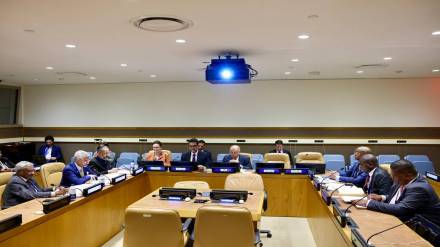In a significant move underscoring global security efforts, the Foreign Ministers of the IBSA (India, Brazil, South Africa) grouping issued a robust declaration against terrorism on the sidelines of the 79th UNGA in New York. The declaration condemned terrorism in all its forms and reaffirmed the collective responsibility of the international community to eliminate terrorist safe havens across the globe.
The IBSA declaration carries considerable weight, not just as a reflection of the nations’ stance but also as a call to action for the global community. The ministers — Dr. S Jaishankar, Amb. Mauro Vieira, the Minister of Foreign Affairs of Brazil, and the Minister of International Relations and Cooperation of the Republic of South Africa, Ronald Lamola, emphasized that terrorism poses a universal threat, one that transcends borders, cultures, and governments. They stressed that efforts to combat terrorism must be firmly rooted in international law, notably the United Nations Charter and international human rights law. This framing underscores a commitment to ensuring that counter-terrorism measures do not infringe upon civil liberties or violate human rights, a delicate balance often debated in the global arena.
Key to the declaration was a call for the establishment of a comprehensive international counter-terrorism framework, placing the United Nations at its core. The three ministers urged for cohesive international cooperation under the UN’s leadership, underscoring the organization’s central role in coordinating efforts against terrorism. This message resonates strongly in a time when multilateralism faces challenges, making it a pivotal reminder of the need for united global responses to crises.
The IBSA ministers specifically highlighted the importance of cross-border security, condemning the movement of terrorists across nations and the financing of terrorist networks.
They called for stringent actions against groups listed by the UN, including notorious organizations such as Al-Qaeda, ISIS/Daesh, Lashkar-e-Tayyiba (LeT), and Jaish-e-Mohammad (JeM). These groups have long posed threats to global peace, and the IBSA declaration reiterates the need for collective vigilance and decisive actions against them.
A significant outcome of the declaration was the renewed commitment to accelerate the adoption of the Comprehensive Convention on International Terrorism at the United Nations General Assembly (UNGA). The adoption of this convention would provide a unified legal framework, reinforcing international efforts to combat terrorism comprehensively.
